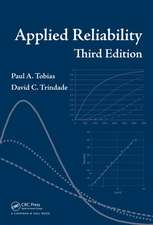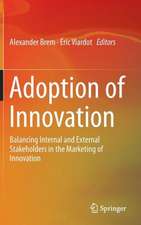Innovation Policy and Governance in High-Tech Industries: The Complexity of Coordination
Editat de Johannes Bauer, Achim Lang, Volker Schneideren Limba Engleză Paperback – 22 feb 2014
| Toate formatele și edițiile | Preț | Express |
|---|---|---|
| Paperback (1) | 782.42 lei 43-57 zile | |
| Springer Berlin, Heidelberg – 22 feb 2014 | 782.42 lei 43-57 zile | |
| Hardback (1) | 645.79 lei 43-57 zile | |
| Springer Berlin, Heidelberg – 5 ian 2012 | 645.79 lei 43-57 zile |
Preț: 782.42 lei
Preț vechi: 954.17 lei
-18% Nou
Puncte Express: 1174
Preț estimativ în valută:
149.71€ • 156.73$ • 123.88£
149.71€ • 156.73$ • 123.88£
Carte tipărită la comandă
Livrare economică 07-21 aprilie
Preluare comenzi: 021 569.72.76
Specificații
ISBN-13: 9783642438318
ISBN-10: 3642438318
Pagini: 324
Ilustrații: XVIII, 306 p.
Dimensiuni: 155 x 235 x 17 mm
Greutate: 0.45 kg
Ediția:2012
Editura: Springer Berlin, Heidelberg
Colecția Springer
Locul publicării:Berlin, Heidelberg, Germany
ISBN-10: 3642438318
Pagini: 324
Ilustrații: XVIII, 306 p.
Dimensiuni: 155 x 235 x 17 mm
Greutate: 0.45 kg
Ediția:2012
Editura: Springer Berlin, Heidelberg
Colecția Springer
Locul publicării:Berlin, Heidelberg, Germany
Public țintă
ResearchCuprins
Introduction.- Part I: Theories and Concepts of Innovation Policy.- Part II: National Systems of Innovation and High-tech Policies.- Part III: Sectoral Perspectives on Innovation Policy.- Part IV: Conclusions
Notă biografică
Johannes M. Bauer is a Professor in the Department of Telecommunication, Information Studies, and Media at Michigan State Univesity. He is also the Co-Director of the Quello Center for Telecommunication Management and Law at Michigan State University. Dr. Bauer joined Michigan State University in 1990 after receiving his doctorate in economics from the Vienna University of Economics and Business Administration, Vienna, Austria. From 1993 until 1998, he directed the Institute of Public Utilities and Network Industries at the Eli Broad Graduate School of Management at Michigan State University. He taught and researched as a visiting professor at the Delft University of Technology, The Netherlands (2000-2001) and the University of International Business and Economics in Beijing, China (2002). His work was published in the leading journals in the field, including Telecommunications Policy, Information Economics and Policy, Communications & Strategies, Telematics & Informatics, and Info.
Volker Schneider is a Professor of Political Science at the University of Konstanz (Germany), where he holds the Chair of Empirical Theory of the State. He received a PhD from the European University Institute in Florence (Italy), and he was research fellow at the Max-Planck-Institute for the Study of Societies in Cologne (Germany) between 1986 and 1997. He has written on policy networks, politics and policy of technology, government-business relations and the evolution of governance structures. In a long term perspective he is work complexity, governance and network theory. He edited several books. Among them are Organized Business Interests in Changing Environments (with J. Grote and A. Lang), Governing Interests: Business Associations Facing Internationalization (with W. Streeck, J. Grote, and J. Visser), and Private Organisation in Global Politics (with K. Ronit).
Achim Lang isAssistant Professor at the University of Konstanz (Germany). He studied public policy and management at the University of Konstanz and the Universidad Complutense de Madrid (Spain). He holds a doctoral degree in political science for his study on the evolution of sectoral business associations. Achim Lang held research positions at the University of Konstanz, the University of Cologne and the Darmstadt University of Technology. He authored Die Evolution sektoraler Wirtschaftsverbände und Informations- und Kommunikationsverbände in Deutschland, Großbritannien und Spanien. He edited Organized Business Interests in Changing Environments (with J. Grote and A. Lang).
Volker Schneider is a Professor of Political Science at the University of Konstanz (Germany), where he holds the Chair of Empirical Theory of the State. He received a PhD from the European University Institute in Florence (Italy), and he was research fellow at the Max-Planck-Institute for the Study of Societies in Cologne (Germany) between 1986 and 1997. He has written on policy networks, politics and policy of technology, government-business relations and the evolution of governance structures. In a long term perspective he is work complexity, governance and network theory. He edited several books. Among them are Organized Business Interests in Changing Environments (with J. Grote and A. Lang), Governing Interests: Business Associations Facing Internationalization (with W. Streeck, J. Grote, and J. Visser), and Private Organisation in Global Politics (with K. Ronit).
Achim Lang isAssistant Professor at the University of Konstanz (Germany). He studied public policy and management at the University of Konstanz and the Universidad Complutense de Madrid (Spain). He holds a doctoral degree in political science for his study on the evolution of sectoral business associations. Achim Lang held research positions at the University of Konstanz, the University of Cologne and the Darmstadt University of Technology. He authored Die Evolution sektoraler Wirtschaftsverbände und Informations- und Kommunikationsverbände in Deutschland, Großbritannien und Spanien. He edited Organized Business Interests in Changing Environments (with J. Grote and A. Lang).
Textul de pe ultima copertă
The book examines the conditions for successful high-technology policy from theoretical and empirical perspectives. It enhances the predominant national systems of innovation approach to innovation policy with concepts based on new developments in the govern-ance of complex systems and processes. The conceptual framework of complex networks and systems is used to examine national policy approaches in countries that have created environments conducive to high-technology industries as well as individual high-technology sectors, such as biotechnology, alternative energy, and aerospace. Theoretical and empirical contributions are synthesised into lessons for high-tech policy and further research.
Caracteristici
Overview of public policies designed to support high-tech industries such as biotechnology, photovoltaics, aeronautics Conceptual framework based on complex adaptive systems theory Comparative analysis of policies in Europe and the US Includes supplementary material: sn.pub/extras















